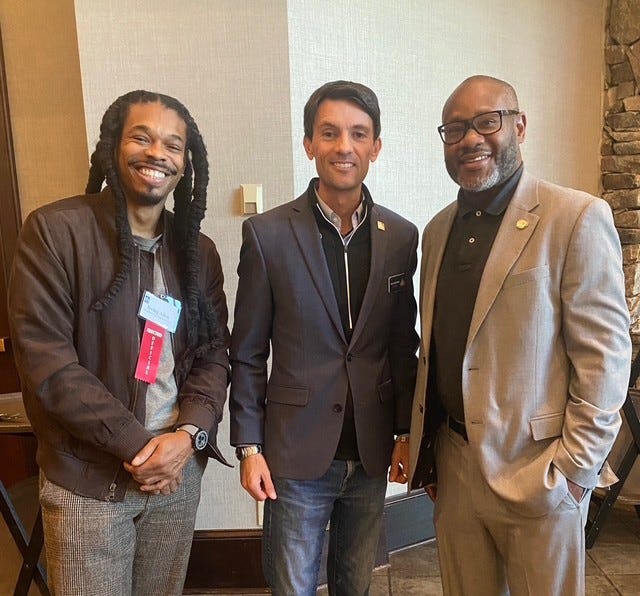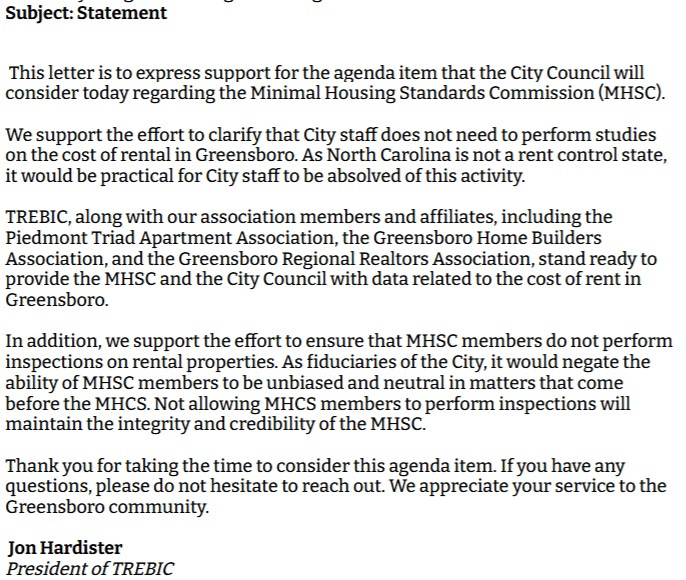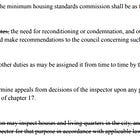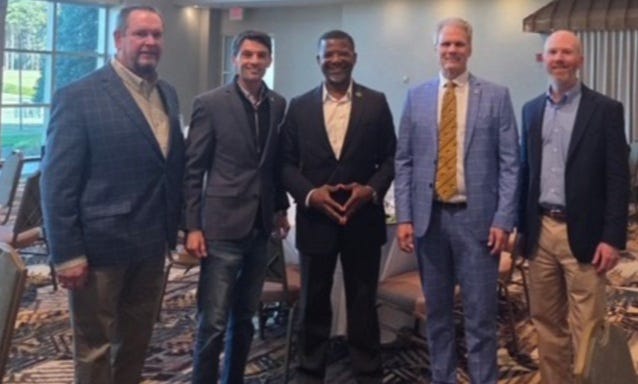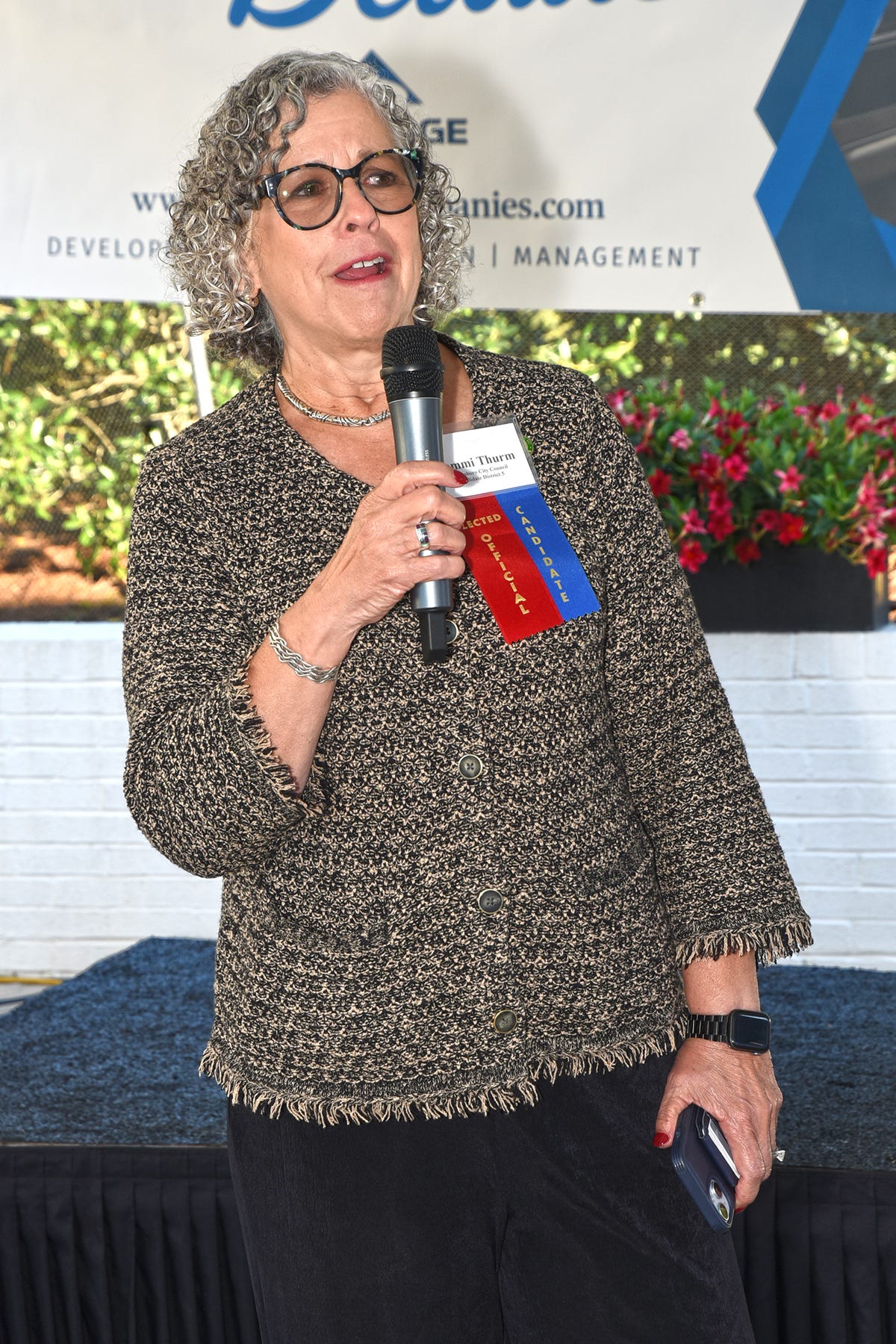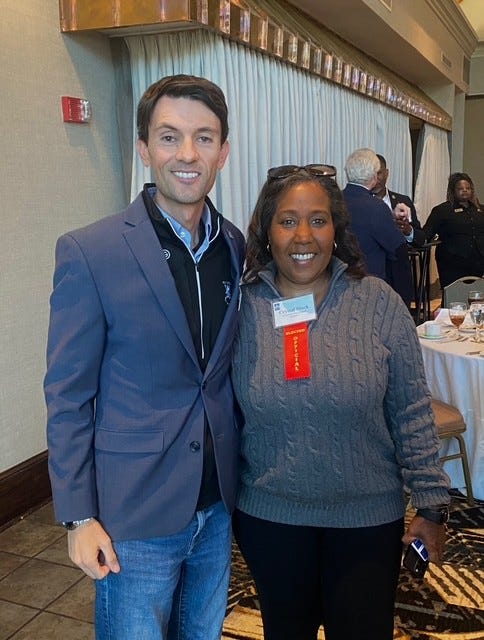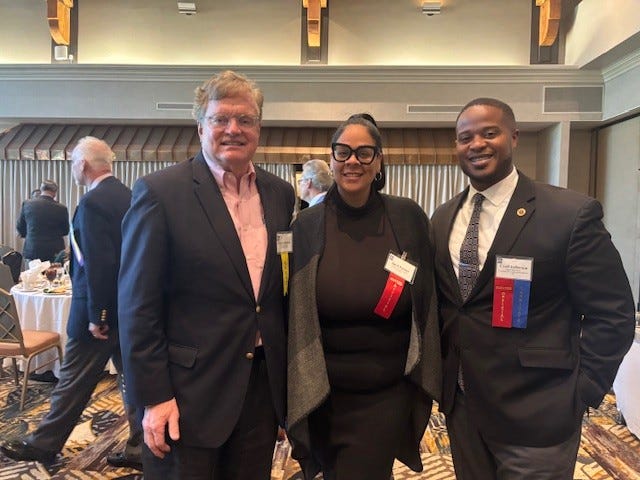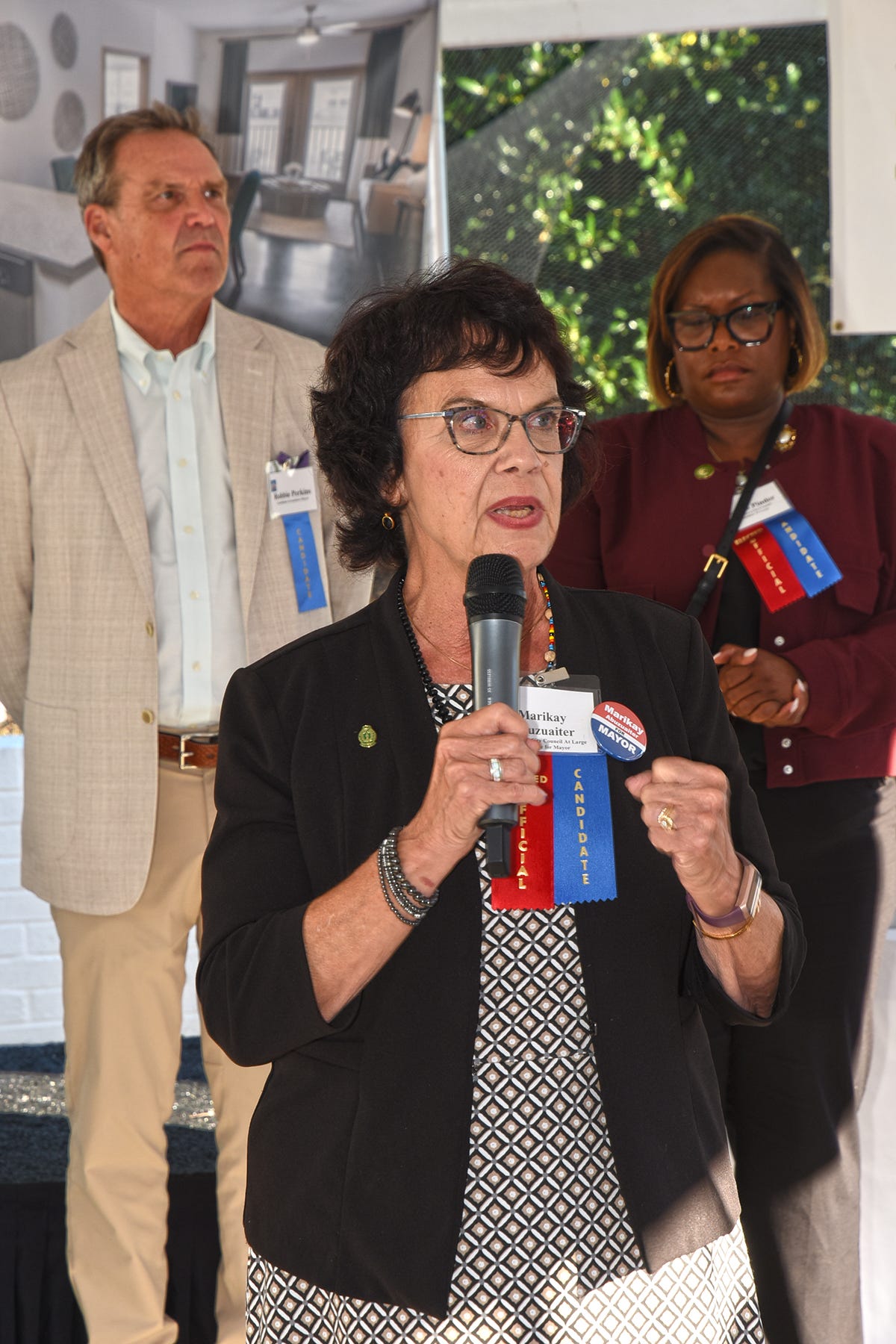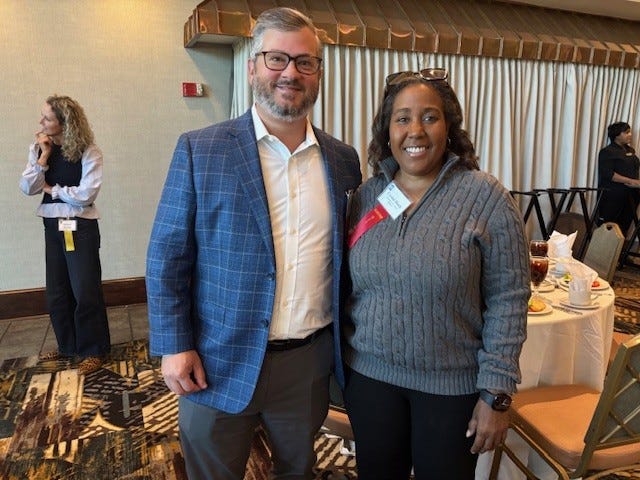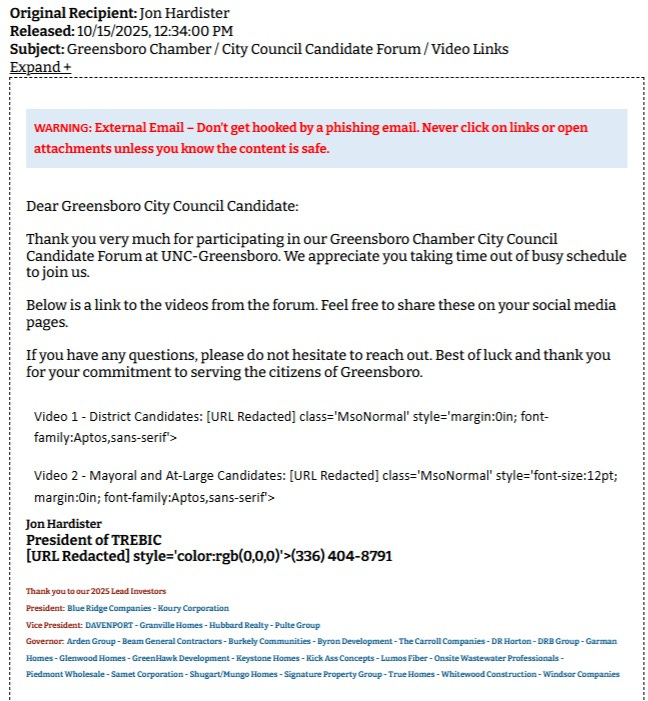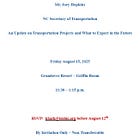A Backchannel Message and an 8–1 Vote; Inside TREBIC’s Email to Greensboro Officials Before the MHSC Decision
A private email to councilmembers’ personal accounts, forwarded only by the mayor, raises new questions about influence, transparency and Greensboro’s weakening housing protections.
On November 18, 2025, hours before Greensboro’s City Council voted 8–1 to restrict the powers of the Minimum Housing Standards Commission (MHSC), a lobbying letter from the Triad Real Estate and Building Industry Coalition (TREBIC) was sent not to the city’s official government email system, but to Mayor Nancy Vaughan’s personal Gmail account.
The email, written by TREBIC President Jon Hardister, urges the council to adopt changes that would end MHSC member inspections of rental properties and halt city staff studies of rental costs. Hardister wrote that allowing commissioners to conduct inspections would “negate the ability of MHSC members to be unbiased and neutral,” and suggested TREBIC and its member organizations could supply rental data in place of city-conducted studies.
Hours later, the City Council voted in favor of the changes. The final tally was 8–1, with Councilmember Hugh Holston, the CEO of the Greensboro Housing Coalition, casting the lone dissenting vote.
TREBIC’s Political Leaders Luncheon was held four days before the vote at Grandover Resort on November 14, 2025. Hardister with incoming At-Larger Councilmember Allen Irving;
The circumstances surrounding the email and the fact that only the mayor forwarded it into the public record raises questions of transparency, process and timing. From TREBIC’s 26th Annual Pig Poultry & Politics (PPP) before the election;
The Letter: A Direct Appeal From TREBIC
Hardister’s email states TREBIC’s support for the council’s agenda item limiting the MHSC’s ability to conduct inspections and analyze rising rents.
He wrote;
City staff should directed to not study rental costs
MHSC members should be prohibited from performing rental property inspections
Real estate industry groups were “ready to provide data” to the city
TREBIC represents major developers, landlords, builders and real estate interests in the Triad. The organization has historically advocated for limits on proactive rental inspections, including the repeal of Greensboro’s (Rental Unit Certificate of Occupancy) RUCO program in 2013. RUCO required proactive inspections of rental units to catch safety hazards before tenants were harmed. Once the program ended, Greensboro shifted to a complaint-based enforcement system, meaning unsafe conditions were addressed only after tenants reported them, often at personal risk. The result was what TREBIC lobbied for; fewer inspections, more deteriorating housing and a system allowing substandard properties to slip through the cracks and leave negligent landlords unaccountable.
Nancy Hoffmann at TREBIC PPP with Barry Segal, whom Hoffmann voted to give the Davie Street parking deck property to;
The content of the letter aligns closely with the policy changes approved later that evening and the argument for not letting commissioners observe during inspections, essentially the same thing espoused by the City Attorney during the debate.
Use of a Personal Email Account Raises Transparency Concerns
The email was not sent to the mayor’s official government address, nor to the city’s public-facing council distribution lists. Instead, it arrived at Vaughan’s private Gmail account.
In North Carolina, any communication about public business, sent to any email address, is a public record. But communications sent to private accounts are significantly harder for the public to discover unless they are voluntarily disclosed.
Mayor Vaughan appears to be the only councilmember who forwarded the TREBIC email to city staff for filing as an official public record. Because of this, it is unclear whether;
other councilmembers also received the email at personal addresses, or
whether they have disclosed it
The combination of personal email usage and a same-day vote raises questions about record-keeping practices and the completeness of the city’s public records archive regarding the MHSC decision.
The Vote: 8–1, With One Unusual Divergence
That evening, the council voted decisively to restrict the MHSC’s activities.
Eight members voted in favor of TREBIC’s recommended limitations.
The structure of the vote became more notable once the email surfaced. Holston, who heads the Greensboro Housing Coalition and has a background in housing advocacy, cast the only dissenting vote on the item, though he hadn’t taken a strong public stance until then.
Whether other councilmembers also received the email privately is not yet confirmed.
Public records requests have been submitted.
Greensboro City Council member Tammi Thurm at PPP;
Timing, Access, and the Public’s Right to Know
Hardister’s message was time-sensitive, arriving just before the council met to determine the direction of the MHSC. Its arrival on personal channels rather than official government systems raisea several procedural questions;
How common is it for lobbyists or industry groups to communicate with elected officials using personal email accounts?
Were other TREBIC communications received outside the official city system?
Have all relevant emails concerning government business been forwarded into the public record as required under North Carolina law?
Has the city clerk requested copies of any personal-account messages related to the MHSC vote?
These questions center not on the policy itself, but on the transparency of the decision-making process and the accessibility of the public record.
A Vote With Lasting Effects
The MHSC vote alters how Greensboro’s volunteer housing board can operate. The commission will no longer observe property inspections, and will no longer review rental-market pricing.
Incoming Council Member Crystal Black with Jon Hardister days before the vote;
TREBIC has offered to supply rental information itself.
What Happens Next
Whether additional communications exist, and whether they were sent through personal or official channels remains an open question.
Incoming Council Member April Parker at a TREBIC event days before the vote;
At minimum, the episode highlighted how backchannel communication, timing and personal-device correspondence can intersect in ways that complicate public transparency, particularly during contentious votes involving influential industry stakeholders.
Incoming Mayor Marikay Abuzuaiter at PPP;
This isn’t just about one email or one vote. It’s about who gets heard when Greensboro decides how safe its housing will be, and who doesn’t. TREBIC and its affiliates had direct, private access to councilmembers’ personal inboxes. The public did not. Their message was clear, and the council’s 8–1 vote echoed it almost perfectly. Greensboro has already lived through the consequences of dismantling proactive oversight once before, when the end of RUCO left tenants with fewer protections and more unsafe homes.
The question now is whether Greensboro’s residents will accept policymaking shaped in the shadows, or demand a system where public safety, not private influence, sets the agenda.
Incoming Councilman and TREBIC member Adam Marshall and Crystal Black;
John Hardister’s letter to a Council Candidate after TREBIC and the Greensboro Chamber of Commerce Forum;
Update; An email exchange after Greensboro’s City Council voted to restrict the powers of the Minimum Housing Standards Commission (MHSC)
From: Cubbage, Lora
Sent: Thursday, November 20, 2025 8:01:45 AM
To: Abuzuaiter, Marikay ; Ducharme, Brent
Cc: Harrell, Andrea ; Roberts, Larry ; Legal Department <LEG@greensboro-nc.gov>
Subject: MSHC Hearing
Madame Mayor -elect,
I am formally requesting that you view the video of the hearing on 11/19/25 and speak with your appointee, the chair of the MSHC, about his decorum in these meetings. The attorney is there to be a legal guide and Mr. Franklin (not sure if that is last or first name) continues to be just outright rude, talks at the attorney and then does not want to give them the opportunity to speak. I experienced the same when I covered for Brent and likely that video is out there as well.
Brent and I discussed this before the meeting as we felt this would be the situation going in. I have informed my staff before he went to the meeting and after he returned and we discussed that once the business of the City is complete, he can let the commission know that if they have questions for him, they are free to email him. This keeps our attorney from being the verbal punching bag for no apparent reason and allows them to continue to handle the business of the city without being subjected to the derogatory monologue that Mr. Franklin insist he must give at these meetings.
I don’t have the authority to tell Mr. Roberts to stay or leave, but he seems to be their target as well. I and Brent have been very respectful and even stayed through the verbal negative diatribe, but we should not have to. Thanks for the consideration in advance and if you would like to discuss further let us know. Thanks.
Respectfully yours,
Lora C. Cubbage
City Attorney
Greensboro City Attorney’s Office
.
.
From: Abuzuaiter, Marikay
Sent: Thursday, November 20, 2025 8:11 AM
To: Cubbage, Lora ; Ducharme, Brent
Cc: Harrell, Andrea ; Roberts, Larry ; Legal Department <LEG@greensboro-nc.gov>
Subject: Re: MSHC Hearing
Thank you.
I will be looking forward to viewing the video - hopefully today. I will then speak to Mr. Franklin Scott. I have no patience for disrespect toward our employees who are doing their job. My stance throughout my entire tenure on Council has been complete respect for staff and I would expect our Commissioners on all Commissions to treat staff in the same manner.
Marikay Abuzuaiter, Mayor Pro Tem
City of Greensboro
.
.
From: Roberts, Larry
Sent: Thursday, November 20, 2025 2:47:47 PM
To: Abuzuaiter, Marikay ; Cubbage, Lora ; Ducharme, Brent
Cc: Harrell, Andrea ; Legal Department <LEG@greensboro-nc.gov>; LaRue, Jarod
Subject: RE: MSHC Hearing
Afternoon all,
Instructions on how to view the video:
From the Market shared drive, you would progress through the following folders: Market//PCD//Code Compliance//Housing Commission//2025//MHC meeting video and audio//11-19-25. IT mentioned support for Drop Box has went away as of late due to the cost. Mentioned putting it in One Drive for others to access. Looking into that now.
For navigational purposes, please see below:
Once you arrive to the videos, there will be a list of 9 total parts. For relevance, Part 2 between the 4:45-7:20 marker, Mr.Scott expresses his concerns. On Part 3 beginning at marker 5:35 through the remainder of that video, he stays consistent with his concerns. Part 4 picks up where part 3 leaves off. Of note, in Part 4 at marker 5:58, Mr. Scott then proceeds to makes his feelings known about City legal. All of Part 4 is consistent with Mr. Scott opinions.
I’ve cc’d Jarod Larue, who oversees our Video/IT production of this Commission. If you have trouble finding the videos, please reach out to him. He may need to lean on IT, so please bear with him.
Again, thank you for addressing this matter.
Larry Roberts, Chief of Compliance
Code Compliance
City of Greensboro
.
.
From: Abuzuaiter, Marikay
Sent: Thursday, November 20, 2025 9:30:41 PM
To: Roberts, Larry ; Cubbage, Lora ; Ducharme, Brent
Cc: Harrell, Andrea ; Legal Department <LEG@greensboro-nc.gov>; LaRue, Jarod <
Subject: Re: MSHC Hearing
I have watched most of MSHC hearing and will finish watching tomorrow. This is appalling and I am actually shocked that anyone would treat staff in such a demeaning and condescending manner.
I was thankful for the gentleman who is new but spoke up to talk about collaboration and moving forward. And, Mr. Jones actually spoke about the way staff must follow procedure and protocol. I had to stop at that point.
Marikay
.
.
From: Cubbage, Lora
Sent: Thursday, November 20, 2025 10:27 PM
To: Abuzuaiter, Marikay Roberts, Larry Ducharme, Brent
Cc: Harrell, Andrea ; LaRue, Jarod
Subject: Re: MSHC Hearing
I watched most of it and I can tell you that the context in which Mr. Franklin claims things were said are not true. And he was the one that blamed Chuck and Tony for statements made. He continues to act like that and then later claims it was everyone else. The good part was the gentleman on the end that said the council meeting was positive and asked him basically to move away from the negativity. You saw no one being derogatory except Mr. Scott.
As for legal staff we will provide legal guidance in the meetings until the business is done. The tenants and the city mean more than to let one person slow us down from progress because they prefer to stay in a negative posture.
Mr. Scott confirmed that when they want legal advice they will reach out and we will honor that and wait for the email after the business of the city is complete. Brent has plenty of work that he could have gotten accomplished in the two hours of negativity. It gained the commission, nor the tenants nor the city anything. There are much more productive ways to spend two hours that could have benefitted the city and tenants and the commission. Our office prefers to be productive.
Hopefully, it will change to allow for the important work to be done. Thanks.
Lora
.
.
Roberts, Larry
11/21/2025, 7:43:00 AM
RE: MSHC Hearing
Expand +
Thanks all,
Going forward from the Code Compliance standpoint, once the agenda items have been addressed, we will allow for a 20min discussion/reflection for city staff to answer questions. If the discussion/reflection continues down a path outside of their responsibility’s at any point during the discussion/reflection, I will grant my staff permission to leave. The Commission made a quick vote on changing meeting times. However, until Mr. Scott (Chair), and Mr. Hawkins (Vice Chair) can show they can stay within the guidelines of their responsibilities, I’m requesting the meeting time stay consistent as is. Brent is also looking into that last matter.
Larry Roberts, Chief of Compliance
Code Compliance
City of Greensboro



